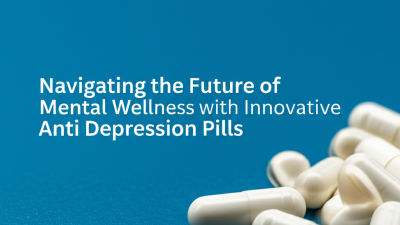In recent years, the discussion surrounding mental health has gained significant momentum, particularly regarding the effective use of Anti Depression Pills. According to the World Health Organization, it is estimated that over 264 million people globally suffer from depression, highlighting the urgent need for effective treatment options. A report by the National Institute of Mental Health indicates that nearly 31.1% of adults in the United States experience an anxiety disorder at some point, often co-occurring with depression, which underscores the importance of comprehensive treatment strategies.

As the medical community continues to evolve, it becomes increasingly crucial to explore innovative strategies for enhancing wellbeing while utilizing Anti Depression Pills. This blog will delve into the top strategies for maximizing the efficacy of these medications, aiming to promote a holistic approach to mental health that not only focuses on pharmacological solutions but also incorporates lifestyle changes and supportive therapies.
 Anti-depression pills come in various forms, each designed to target specific symptoms and underlying causes of depression. The most common types are selective serotonin reuptake inhibitors (SSRIs), serotonin-norepinephrine reuptake inhibitors (SNRIs), and atypical antidepressants. SSRIs, such as fluoxetine and sertraline, are frequently prescribed because they can effectively elevate mood with relatively fewer side effects. SNRIs like venlafaxine are effective for both depression and anxiety, offering a dual benefit that can be advantageous for individuals struggling with multiple conditions.
Anti-depression pills come in various forms, each designed to target specific symptoms and underlying causes of depression. The most common types are selective serotonin reuptake inhibitors (SSRIs), serotonin-norepinephrine reuptake inhibitors (SNRIs), and atypical antidepressants. SSRIs, such as fluoxetine and sertraline, are frequently prescribed because they can effectively elevate mood with relatively fewer side effects. SNRIs like venlafaxine are effective for both depression and anxiety, offering a dual benefit that can be advantageous for individuals struggling with multiple conditions.
In addition to traditional medications, there are also newer classes of anti-depression pills, such as ketamine and esketamine, which show promise for treatment-resistant depression. These medications can provide rapid relief for those who have not responded to conventional treatments. Each type of medication serves to rebalance critical neurotransmitters in the brain, ultimately aiming to enhance overall wellbeing. While medications are an essential component of treatment, they should ideally be used in conjunction with therapy and lifestyle changes to maximize their benefits and ensure a holistic approach to managing depression.
The role of anti-depression pills in enhancing emotional wellbeing is increasingly supported by research, highlighting their potential to significantly improve mental health outcomes. According to a report from the National Institute of Mental Health, approximately 17.3 million adults in the U.S. experienced at least one major depressive episode in the past year, demonstrating the critical need for effective interventions. Anti-depression medications, particularly Selective Serotonin Reuptake Inhibitors (SSRIs), work by increasing serotonin levels in the brain, which can lead to an improvement in mood and overall emotional wellbeing.
Moreover, a study published in the Journal of Clinical Psychiatry indicates that nearly 60-70% of individuals with major depressive disorder may benefit from pharmacological treatment. This substantial success rate underscores the importance of anti-depression pills as a viable strategy for alleviating symptoms of depression. Combining medication with therapy can enhance these effects, providing a dual approach that fosters resilience and emotional stability. Advances in personalized medicine are also paving the way for more tailored treatments, which may lead to improved outcomes for patients grappling with diverse emotional challenges.
The effectiveness of anti-depression pills in improving daily functionality has been substantiated by various studies. According to the National Institute of Mental Health, approximately 19.9 million adults in the U.S. experience at least one major depressive episode annually. These medications, primarily selective serotonin reuptake inhibitors (SSRIs), have been instrumental in alleviating symptoms of depression, which in turn can enhance the quality of everyday life. For instance, research published in the Journal of Clinical Psychiatry indicates that over 60% of patients report significant improvements in daily activities after consistent use of these medications.
The integration of anti-depression pills into a treatment plan not only impacts mood but also facilitates cognitive function, social engagement, and overall well-being. A study from Harvard Medical School found that individuals using antidepressants were 2.5 times more likely to resume work or engage in social activities compared to those who did not use any pharmacological treatment. This underscores the role of these medications in breaking the cycle of withdrawal and inactivity that often accompanies depression, thus leading to a more productive and fulfilling life.
Combining therapy with medication is increasingly recognized as a holistic approach to enhancing wellbeing, especially for those battling depression. Research indicates that nearly 30% of individuals receiving antidepressants do not experience significant improvements in their symptoms (National Institute of Mental Health, 2023). However, when therapy is integrated, outcomes improve substantially. According to a study published in the Journal of Clinical Psychiatry, patients who engage in cognitive-behavioral therapy alongside their medication are 50% more likely to see considerable reductions in their depressive symptoms compared to those who rely on medication alone.
Moreover, the synergistic effects of therapy and medication are supported by statistical evidence. The American Psychological Association reports that individuals who utilize both treatment modalities have a higher chance of achieving remission from depressive disorders. This combined strategy not only helps to alleviate symptoms more effectively but also addresses the underlying issues that often contribute to depression. As professionals advocate for this dual approach, it is crucial for patients to engage in open discussions with their healthcare providers about their treatment options, ensuring they receive a comprehensive and personalized plan for improving their overall wellbeing.
When considering the use of antidepressants for managing major depressive disorder, understanding their long-term safety and potential side effects is crucial. Recent analyses reveal a range of neurological adverse events linked to these medications, underscoring the need for comprehensive discussions between patients and healthcare providers. It's essential to weigh the benefits against these risks, especially when options like serotonin reuptake inhibitors are frequently prescribed.
As the use of antidepressants rises, particularly for conditions like chronic pain, patients may find themselves navigating a complex landscape of treatment efficacy. A systematic review indicated some antidepressants might offer relief for certain chronic pain conditions, yet their overall effectiveness varies significantly. This inconsistency highlights the importance of informed decision-making, as well as exploring alternative treatments, such as ketamine for severe depression. Informed choices empower patients, enabling them to advocate for their health while considering safer, potentially effective options available to them.






